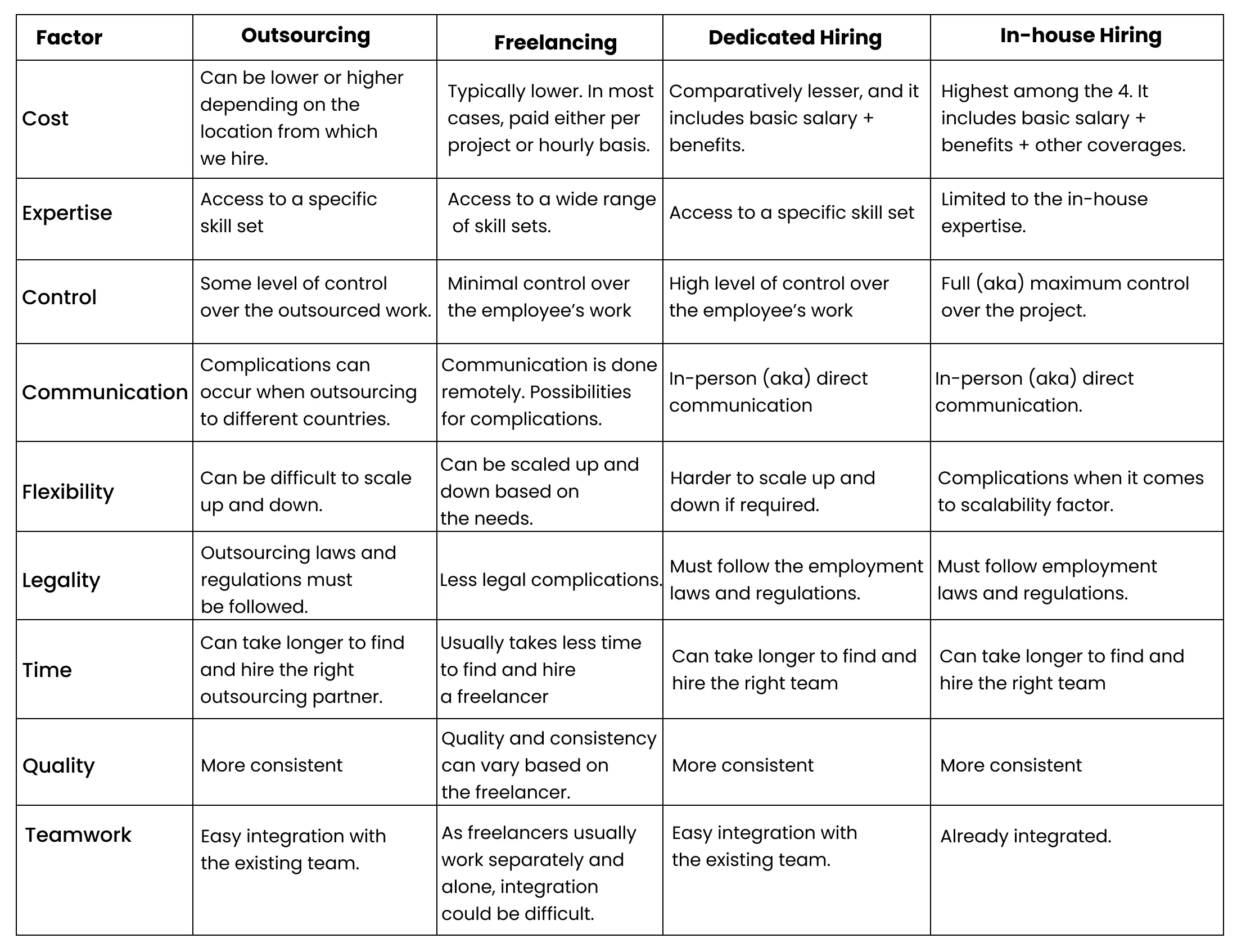

Table of Contents:
Quick Summary
Businesses are always looking for ways to streamline their operations and minimize expenses in the constantly evolving world of business. A crucial decision businesses need to make is whether to outsource, hire freelancers, or employ a dedicated team of developers to fulfill their requirements such as app development and other related solutions.. Each option has its own advantages and disadvantages and it's important to comprehend the difference between them to make a well-informed decision.
This blog post explores the distinctions between outsourcing, freelancing, and dedicated hiring and provides guidance on how to determine which approach is best for your business. Let us examine the pros and cons of each option, the financial implications, and the level of control and supervision provided. By the end of this blog, you will have a clear understanding of outsourcing versus freelancers versus dedicated developers, paving the way for you to make the best decision possible that leads to your business growth.
What Is Outsourcing?
Outsourcing is a business practice in which an external company or team is hired to carry out specific tasks or projects. It is a cost-effective approach that allows businesses to access specialized expertise, technology, and resources that they may not have in-house. Outsourcing can take different forms such as,
1. Offshore outsourcing.
2. Nearshore outsourcing.
3. Onshore outsourcing
- Offshore outsourcing involves hiring an external team from a different country.
- Nearshore outsourcing involves hiring a team from a neighboring country.
- Onshore outsourcing involves hiring an external team within the same country.
The IT industry is one of the sectors where outsourcing is particularly popular due to its specialized technical expertise. This includes software development, database management, and cyber-security. However, outsourcing can also be used for non-technical tasks like accounting, marketing, or customer service.
Outsourcing helps organizations to concentrate on their core competencies, reduce costs, enhance efficiency, and provide flexibility. However, efficient communication and management are essential to ensure effective collaboration between the external team and the organization, and to maintain quality control.

24% of small businesses outsource to increase the efficiency of their businesses.
What Is Freelancing?
Freelancing is a popular business arrangement where an individual is hired on a temporary basis to perform specific tasks or projects for a company. Freelancers are self-employed and work independently, providing their services to multiple clients. This approach is increasingly common in today's business world as it enables companies to access specialized skills and expertise without having to commit to hiring full-time employees.
Freelancers work remotely and offer various services such as graphic design, content creation, web development, and marketing. They can work on a project-by-project or ongoing basis, depending on the company's needs. Freelancers usually set their own rates and work according to their schedules, providing flexibility for both parties.
Hiring freelancers can be cost-effective for businesses since they do not have to provide benefits, office space, or equipment. It also enables companies to access specialized skills and expertise for a specific project without committing to a long-term contract. However, effective communication and project management are necessary when working with freelancers to ensure that the work is completed to the required standard and within the specified time-frame. In conclusion, freelancing is a practical and efficient way to obtain specialized skills and resources for businesses that need them.
What Is Dedicated Hiring?
Dedicated hiring is a business model that involves hiring a full-time, remote employee who works exclusively for one company. This approach is often used when a business has a need for a specific skill set or expertise and requires a more long-term commitment than freelancing or outsourcing.
To put it simply, dedicated remote developer hiring is a method employed by businesses to recruit a full-time software developer who operates remotely and exclusively for the organization. Under this framework, the developer is an essential part of the company's team, working on its projects on a full-time basis. This strategy provides businesses with access to a broader pool of talent, which can be highly advantageous, especially if they have specific technical needs or face a shortage of local talent. Additionally, hiring dedicated remote developers can be cost-effective for companies as they don't have to incur expenses related to office space, equipment, or facilities.
This model provides several advantages for businesses, including access to a full-time employee with specific skills and expertise, cost savings compared to hiring an in-house employee, and improved flexibility in terms of location and working hours. Additionally, dedicated hires often have a better understanding of the company's culture and goals, leading to more effective collaboration and a stronger sense of team spirit. However, effective communication and management are crucial when working with dedicated hires to ensure they remain productive and motivated while working remotely.
Clear expectations, regular check-ins, and well-defined project goals can help ensure that the dedicated hire is meeting the company's needs and contributing to its success.

Comparing The Business Models Of Outsourcing - Freelancing - Dedicated Remote Devs
Outsourcing, freelancing, and dedicated hiring are three different business models that companies use to hire external talent. Here are some key differences between these models:
Definition
Outsourcing involves hiring an external company or service provider to perform a specific task or project, while freelancing involves hiring an individual contractor to work on a specific project or task. Dedicated hiring involves hiring a full-time employee who will work exclusively for the company.
Scope
In general, outsourcing is typically utilized for more extensive projects or tasks that necessitate a team with a diverse range of expertise. Freelancing, on the other hand, is commonly employed for smaller projects or tasks that require a specific set of skills. Dedicated hiring, however, is typically employed for long-term projects or tasks that require ongoing support.
Control
When it comes to control, outsourcing provides the hiring company with a greater level of oversight over the project or task because they are working with a team that is managed by the outsourcing company. On the other hand, freelancing gives the hiring company less control over the project because the contractor typically works independently. With dedicated hiring, the hiring company has the highest degree of control since the employee is a part of the company and can be managed directly.
Want to build your own custom mobile application?
Contact UsCost
The costs associated with outsourcing tend to be higher compared to freelancing or dedicated hiring, as it entails paying for the services of an entire team. Freelancers typically charge lower rates since they work independently and don't have to bear the overhead costs of a company. On the other hand, dedicated hiring can be expensive in terms of compensation and benefits, but it may prove to be a cost-effective approach in the long run if the employee is highly skilled and adds ongoing value to the company.
Relationship
Outsourcing typically involves creating a long-term partnership with a service provider, whereas freelancing is often a one-time project or a short-term commitment. Dedicated hiring entails establishing a long-term relationship with an employee who is committed to working solely for the company.
Communication
Both outsourcing and dedicated hiring necessitate clear communication between the hiring company and the service provider or employee since they work together as a team. On the other hand, freelancers may require less communication because they tend to work independently.
To recapitulate, outsourcing, freelancing, and dedicated hiring are separate business models that have their own merits and demerits, contingent on the specific needs of the hiring company. It is vital to consider these factors while deciding which model to employ for a given project or task.

Outsourcing - Pro's And Con's
Outsourcing method has its fair share of pros and cons. Let’s see them one by one right away,
Pro's
Cost-effective - Outsourcing can save money as businesses do not have to spend on hiring and training employees for specific tasks.
Access to specialized expertise and technology - Outsourcing provides businesses with access to expertise and technology that may not be available in-house.
Flexibility - Outsourcing teams can be scaled up or down based on the project needs, offering businesses greater flexibility.
Focus on core factors - Outsourcing allows businesses to focus on their core competencies while leaving specialized tasks to external teams.
Con's
Quality control issues - Lack of direct supervision can result in quality control issues when outsourcing.
Communication difficulties - Language barriers and cultural differences can lead to communication difficulties with external teams
Security risks - Outsourcing may pose security risks, particularly when sensitive data is shared with external teams.
Dependency - Outsourcing can lead to dependency on external teams for critical tasks and projects, which may be challenging to manage
Freelancing - Pro's And Con's :
Let’s see the pros and cons of practicing freelancing,
Pro's
Access specialized skills - Ability to access specialized skills and expertise for specific tasks or projects that may not be available in-house.
Cost efficient - Cost-effective approach as businesses do not have to provide benefits, office space, or equipment, leading to potential cost savings.
Flexibility - Flexibility to work on a project-by-project basis or an ongoing basis, depending on the business needs.
Diverse options - Opportunity to collaborate with a diverse pool of talent from around the world.
Con's
Complications in managing - Managing multiple freelancers for larger projects can be challenging and time-consuming.
Dependency - Dependence on freelancers for critical tasks and projects can increase the risk of delays or complications
Communication difficulties - Communication difficulties can arise due to language barriers and time zone differences, leading to potential misunderstandings.
Lack of supervision - Quality control issues can arise due to the lack of direct supervision and oversight of freelancers.
Dedicated Hiring - Pro's And Con's :
Following the two, now let’s go through the advantages and disadvantages of hiring dedicated remote developers,
Pro's
Full commitment - Dedicated developers offer a higher level of commitment and understanding of the project, leading to better outcomes.
Direct supervision - Direct supervision and communication channels enable better quality control and management of the development process.
Flexibility - Flexibility to scale the team size up or down based on the project's changing requirements.
Under control - Enhanced control over the development process and timeline
Con's
Expensive - Dedicated hiring is a more expensive approach than outsourcing or hiring freelancers.
Time consuming - The recruitment and on-boarding process can be time-consuming and may delay the project's start.
Limited access to skills - Limited access to specialized skills and expertise that may not be available in-house
Dependency - Dependence on a smaller team for critical tasks and projects may increase the risks of delays or setbacks
Which One Is More Affordable?
Affordability is a crucial factor that businesses take into account while deciding between outsourcing, freelancers, and dedicated developers. The cost of development can significantly differ based on the option that you choose, so it's crucial to consider your choices meticulously.
Outsourcing has become a popular option among businesses seeking cost-effective solutions for their development needs. This is because outsourcing enables businesses to hire a development team from a low-cost country, where labor rates are typically lower than in their home country. Furthermore, outsourcing firms usually have a large pool of talented developers, designers, and project managers who can effectively handle complex projects.
Additionally, outsourcing companies often provide project management services, which means businesses do not need to hire a separate project manager to manage their development projects. Despite the benefits of outsourcing, it is not without its risks. One of the main concerns when outsourcing is ensuring the quality of work, communication, and collaboration with a remote team. As businesses work with a team located in a different region, time zone, or culture, there may be communication barriers that can hinder the success of the project. Therefore, it's crucial to find a reliable outsourcing partner with proven experience and a track record of delivering high-quality work.
Businesses seeking cost-effective solutions for their development needs may consider hiring freelancers as an option. Freelancers are an affordable choice as they offer the option to hire an individual developer or a small team of developers at a lower rate than a dedicated development team. Additionally, freelancers typically charge on an hourly or project basis, which means that businesses can choose the payment model that best suits their budget.
One of the significant advantages of hiring freelancers is their diverse range of skills and expertise. Freelancers often have experience working on a broad range of projects, giving them a unique perspective and the ability to bring innovative solutions to the table. However, there are risks associated with hiring freelancers. Therefore, it's essential to vet potential freelancers carefully and ensure that they have a good reputation in the industry before hiring them for a project.
Engaging a dedicated development team for your project may come at a higher cost compared to outsourcing or hiring freelancers since you will be hiring a team of developers solely for your project. The expense may vary based on the team's level of expertise, experience, and location. Nevertheless, a dedicated development team provides benefits such as increased control, accountability, direct communication, and collaboration. They can also provide tailor-made solutions that cater to your business's unique requirements.
Final Thoughts On Affordability
To summarize, while outsourcing may seem like the cheapest choice, it poses several risks that can impact work quality, communication, and collaboration. Although freelancers offer cost-effective rates, their availability may be limited, and their accountability may not be dependable. Dedicated development teams are pricier but provide enhanced control, accountability, and personalized solutions. Ultimately, selecting the ideal option for your business hinges on factors like project requirements, budget, and the desired degree of control and accountability.
Which One Is Best For Business? - A Deep Analysis
When it comes to expanding a business team and improving services, there are various options available such as outsourcing, hiring freelancers, or dedicated developers. However, deciding the best approach depends on multiple factors and each method has its own set of advantages and disadvantages.
Outsourcing is an economical solution for businesses that require completion of specific tasks or projects without committing to full-time employees. This approach allows businesses to access specialized expertise and technology that may not be available in-house, and to scale up or down their team as per project requirements. Outsourcing provides flexibility as businesses can choose to outsource on a project-by-project basis or an ongoing basis. Nonetheless, outsourcing may bring quality control issues due to lack of direct supervision, and communication difficulties may arise because of language barriers and cultural differences. Moreover, there may be security risks associated with sharing sensitive data with external teams, and businesses may become dependent on external teams for critical tasks and projects.
Hiring freelancers is another option for businesses that require specialized skills and expertise for specific tasks or projects. This approach is cost-effective as businesses do not have to provide benefits, office space, or equipment. Freelancers offer flexibility as they can work on a project-by-project basis or on an ongoing basis, and businesses can work with a diverse pool of talent from all over the world. However, quality control issues may arise due to lack of direct supervision, and dependence on freelancers for critical tasks and projects may occur. Communication difficulties may arise due to language barriers and time zone differences, and it can be challenging to manage multiple freelancers for larger projects.
Dedicated developers are an option for businesses that require a committed team with a deep understanding of their business needs. Direct supervision and communication channels allow for better quality control, and businesses have greater control over the development process and timelines. They offer flexibility as teams can be scaled up or down as per project requirements. However, hiring dedicated developers can be more expensive compared to outsourcing or freelancers. Recruitment and on-boarding processes can be time-consuming, and businesses may have limited access to specialized skills and expertise that may not be available in-house. Moreover, dependency on a smaller team for critical tasks and projects may occur.

Conclusion
In conclusion, businesses should evaluate their priorities, resources, and project requirements before deciding on an approach. Outsourcing, freelancers, and dedicated developers all have their own benefits and challenges, and the best approach depends on the business's specific situation. Cost, quality control, communication, and dependency are factors to consider when deciding between these options. It is crucial to select an approach that fits the business's needs and provides maximum value.





















